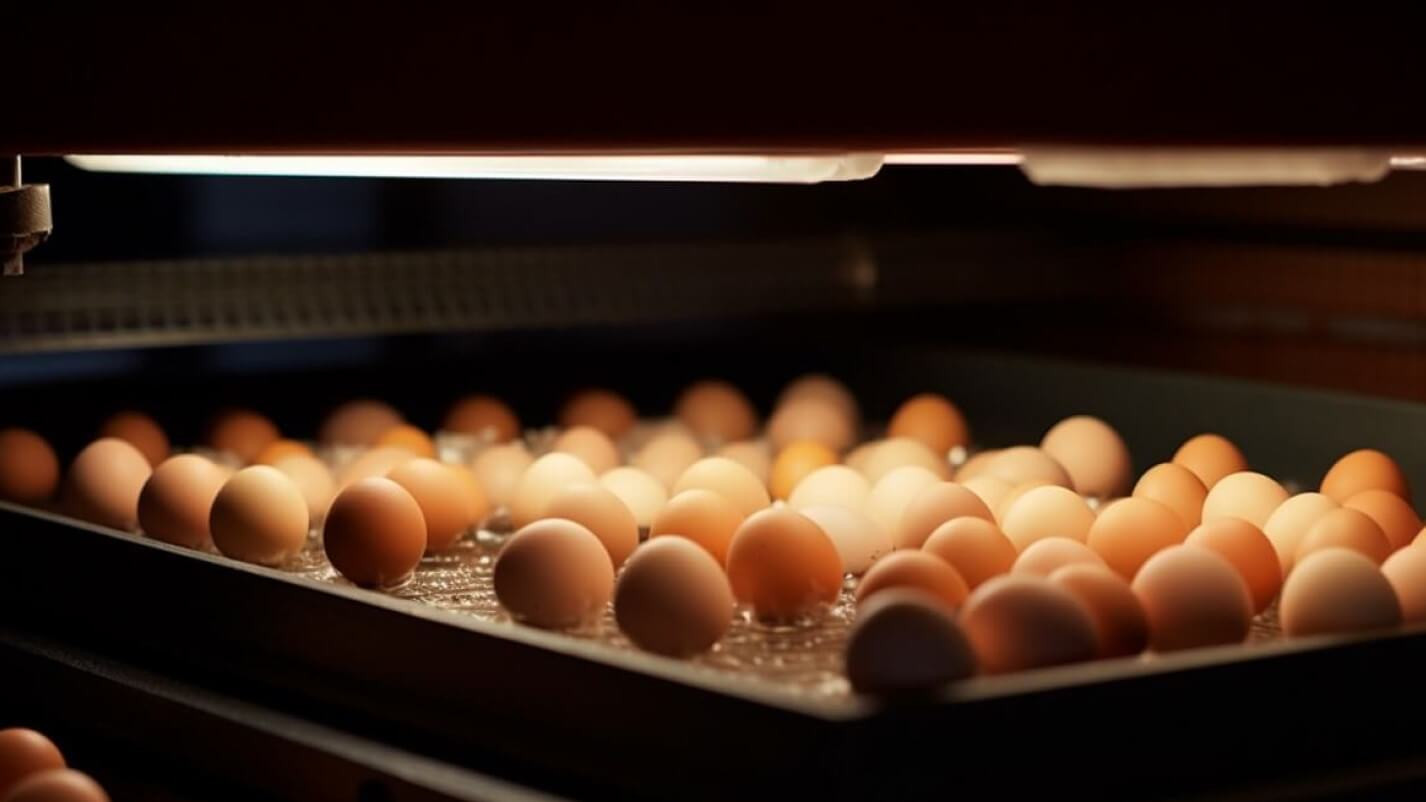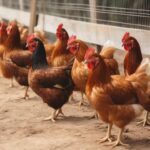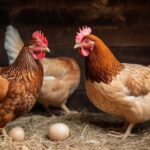Would you prefer to listen to a short podcast discussion about this article? Click on the audio below.
Table of Contents
Hatching eggs can be a rewarding and cost-effective way to raise your chickens. It’s an exciting process that can lead to healthier, more robust birds better adapted to your environment. If you’re a beginner looking to hatch your eggs, this guide will take you through the basics of egg selection, incubation, and post-hatch care.
We’ll cover everything from the types of incubators to common hatching problems to raising healthy chicks. By the end of this guide, you’ll have the knowledge to hatch your eggs and start your backyard flock. It doesn’t matter if you have chicken hatching eggs, duck hatching eggs, silkie hatching eggs, geese hatching eggs, or turkey hatching eggs – whatever eggs they are, this guide to hatching eggs will help you.
Introduction to Hatching Eggs UK
Hatching eggs is an exciting and rewarding experience for any beginner interested in raising poultry. Hatching eggs involves incubating them until they hatch into cute little chicks. It can be a fun and educational activity for families, schools, or anyone interested in raising their chickens, ducks, or other birds. In this beginner’s guide, we will cover everything you need to know to hatch your eggs successfully.
Why Hatch Your Own Eggs?
Hatching your own eggs has several benefits. Firstly, it can be a cost-effective way to expand your flock, as hatching your eggs is usually cheaper than buying day-old chicks. Secondly, it can be a fun and educational activity for children or anyone interested in learning about the life cycle of poultry. Lastly, by hatching your own eggs, you have control over the quality of the chicks that will hatch, ensuring that they come from healthy, well-cared-for parents.
The Benefits of Hatching Your Own Eggs
Another benefit of hatching eggs is that it enables you to breed your poultry. This means you can select the best birds from your flock and produce them to improve the quality of your community over time. Additionally, hatching eggs can be a great way to introduce new breeds or genetic traits to your flock. Finally, hatching eggs is a sustainable practice that enables you to produce your food, whether it be eggs or meat, in a more ethical and environmentally friendly way.
Selecting the Right Eggs to Hatch
Hatching healthy, viable chicks starts with choosing the right eggs to incubate. Here are some things to consider when selecting eggs:
Fertile vs Infertile Eggs
Only fertile eggs will hatch, so it’s essential to ensure the eggs you select are fertile. You can determine if an egg is fertile by candling it, which involves shining a bright light through the egg to see the embryo inside. Infertile eggs will be clear or have a small white spot, while fertile eggs will have a developing embryo that looks like a spiderweb.
Egg Selection Criteria
When selecting eggs to incubate, choosing fresh, clean, and free of cracks or deformities is essential. Eggs that are too old or dirty may not develop properly, while cracked or deformed eggs may not hatch. Additionally, it’s best to choose eggs from healthy, well-cared-for parent birds that are free from disease and parasites. You need good, fertile hatching eggs.
Preparing the Incubator for Hatching
Properly preparing the incubator is crucial to hatching healthy, viable chicks. Here are some things to consider when setting up your incubator:
Types of Incubators
Several types of incubators are available, including still-air incubators, forced-air incubators, and cabinet incubators. Still, air incubators are the most straightforward and affordable, but they may not provide consistent temperature or humidity. Forced air incubators are more effective at circulating air and maintaining a constant temperature, while cabinet incubators are the most advanced and can hold more eggs.
Setting Up the Incubator
Before setting up the incubator, cleaning it thoroughly and ensuring that all parts are working correctly is essential. Once the incubator is clean, fill the water tray and turn on the incubator to allow it to reach the desired temperature and humidity. It’s also important to calibrate the incubator to maintain the correct temperature and humidity throughout the hatching process.
The Hatching Process: What to Expect
The hatching process can take 19 to 31 days, depending on the type of bird you are hatching. Here are some things to expect during the hatching process:
Incubation Periods for Different Poultry
The incubation period for chicken eggs is around 21 days, duck eggs take about 28 days, and turkey eggs take about 28-31 days. Therefore, it’s essential to research the incubation period for the type of bird you are hatching to ensure that you are prepared for the hatching process.
The Hatching Process
During the hatching process, the eggs will begin to pip, or crack open, as the chicks inside prepare to hatch. It’s essential to resist the urge to help the chicks out of their shells, as this can cause injury or even death. Instead, let nature take its course and wait for the chicks to hatch. Once the chicks have hatched, transferring them to a brooder is essential to keep them warm, dry, and well-fed.

Caring for Chicks: Post-Hatch Care
Once your chicks have hatched, providing them with proper care in their early stages of life is essential. First and foremost, you must provide them with the right environment for brooding and feeding. This means setting up a warm, cosy brooder with all the necessary equipment and supplies. You must also ensure they get the proper nutrition, water, and heat. Managing the temperature and humidity levels is also crucial to their health and well-being.
Brooding and Feeding Chicks
In the first few days after hatching, chicks must be kept in a brooding area with a heat source to keep them warm. A brooder lamp is a good option for providing heat. Chicks need access to food and water as soon as they hatch. You can start them with chick starter feed and ensure they always have access to clean drinking water. Once they start growing, you can switch them to grower or layer feed, depending on what kind of birds they are.
Managing Temperature and Humidity
Temperature and humidity levels are crucial to a chick’s survival. The temperature in the brooder should be kept between 90-95°F for the first week, after which it can be gradually reduced by 5°F each week until it reaches room temperature. Humidity levels should be between 40-60% during the first week and lowered gradually over time. A thermometer and a hygrometer are excellent ways to monitor the temperature and humidity levels.
Troubleshooting Common Hatching Problems
Despite your best efforts, hatching eggs can present some unexpected challenges. Therefore, it’s essential to identify common issues and have solutions to rectify them.
Identifying Common Issues
Some common hatching problems include weak or underdeveloped chicks, chicks that are not hatching, and chicks that are hatching too early or too late. Issues with the incubator or improper handling of the eggs can cause these.
Solutions to Common Problems
One way to address these issues is by ensuring that you are using the right incubator and that it is in good condition. You should also ensure the eggs are correctly handled and stored before incubation. If you notice any weak or underdeveloped chicks, you may need to provide extra care and support to ensure their survival. If chicks are hatching too early or too late, this may be a sign of incubation issues that must be rectified.
Raising Healthy Chickens: Tips and Tricks
Raising healthy chickens involves proper feeding, nutrition, and protection against predators and disease.
Feeding and Nutrition
Providing your chickens with suitable feed and nutrition is essential for their health and well-being. Chickens need a well-balanced diet that includes various foods such as grains, protein, vegetables, and fruits. In addition, make feeds appropriate for their age and nutritional requirements and provide them with fresh water daily.
Protecting Against Predators and Diseases
Predators can be a common threat to chickens, so taking steps to protect them is essential. This may include building a secure coop, installing fencing or electric netting, and using predator deterrents. The disease can also be a concern, so keep chicken coops clean and hygienic and monitor your flock for signs of illness. Regular veterinary checkups can also help to catch any potential problems early on.
Conclusion: The Rewards of Hatching Your Eggs
Raising chickens can be a rewarding experience in terms of the joy of growing your flock and the cost savings that come with hatching your eggs.
The Joy of Raising Your Chickens
Raising your chickens can be a fun and fulfilling experience. You get fresh and healthy eggs to eat and enjoy watching your chicks grow and develop into full-grown chickens. In addition, there’s something special about the bond between chickens and their owners.
The Cost Savings of Hatching Your Eggs
Hatching your eggs can also save you money in the long run. Not only do you avoid the costs of buying chicks from a store, but you can also sell any hatchlings you don’t need to other chicken keepers. Additionally, having your flock of chickens means you have a reliable source of fresh eggs.
Overall, the benefits of hatching your eggs are numerous and can lead to a satisfying and sustainable way of life. Hatching your eggs can be a fun and rewarding experience that leads to a thriving backyard flock. From selecting the proper eggs to caring for chicks after hatching, there are many steps to ensure success. Following the tips and tricks outlined in this guide will make you well on your way to hatching healthy, happy chickens.
Remember, the key to successful hatching is patience and attention to detail. With some practice, you’ll be a pro at hatching eggs in no time!

FAQ
What kind of eggs can be hatched?
Most hen eggs can be hatched, including those from bantam breeds. However, it’s important to note that not all eggs are fertile or suitable for hatching. Therefore, purchasing eggs from a reputable breeder or hatchery is best to ensure the best possible results.
What is the ideal temperature for hatching eggs?
The ideal temperature for hatching eggs is around 99.5°F (37.5°C). However, monitoring the temperature closely throughout incubation is essential to ensure consistency.
How often do I need to turn the eggs?
Eggs should be turned at least thrice daily during the incubation period, ideally every few hours. Most incubators will automatically turn the eggs, but you must turn them by hand if you’re using a manual incubator.
How soon can I move the chicks after hatching?
Chicks should be kept in the incubator or brooder for at least 24 hours after hatching to dry off and rest. After this time, they can be moved to a larger brooder with appropriate heat and water sources.
For more information, visit The British Poultry Council
If you require any assistance with this article, please do not hesitate to Contact Us




















